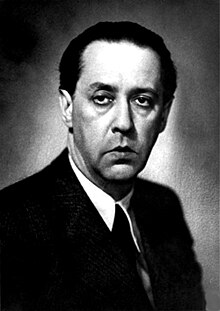Sándor Márai
| Sándor Márai | |
|---|---|

Sándor Márai
|
|
| Born |
April 11, 1900 Kassa (Košice), Kingdom of Hungary, Austria-Hungary |
| Died | February 21, 1989 (aged 88) San Diego, United States |
| Occupation | Writer |
| Language | Hungarian |
| Nationality | Hungarian |
| Notable awards | Kossuth Prize (in memoriam) |
| Spouse | Ilona Matzner |
Sándor Márai (originally Sándor Károly Henrik Grosschmied de Mára, archaically English: Alexander Márai; 11 April 1900 – 21 February 1989) was a Hungarian writer and journalist.
He was born in 1900 on April 11 in the city of Kassa, Hungary (now Košice, Slovakia). Through his father, he was a relative of the Hungarian noble Országh family. In his early years, Márai travelled to and lived in Frankfurt, Berlin, and Paris and briefly considered writing in German, but eventually chose his mother language, Hungarian, for his writings. In Egy polgár vallomásai, Márai identifies the mother tongue language with the concept of nation itself. He settled in Krisztinaváros, Budapest, in 1928. In the 1930s, he gained prominence with a precise and clear realist style. He was the first person to write reviews of the work of Franz Kafka.
He wrote very enthusiastically about the First and Second Vienna Awards, in which Germany forced Czechoslovakia and Romania to give back part of the territories which Hungary lost in the Treaty of Trianon. Nevertheless, Márai was highly critical of the Nazis.
Marai authored 46 books. His 1942 book Embers (Hungarian title: A gyertyák csonkig égnek, meaning "The Candles Burn Down to the Stump") expresses a nostalgia for the bygone multi-ethnic, multicultural society of the Austro-Hungarian Empire, reminiscent of the works of Joseph Roth. In 2006 an adaptation of this novel for the stage, written by Christopher Hampton, was performed in London.
...
Wikipedia
